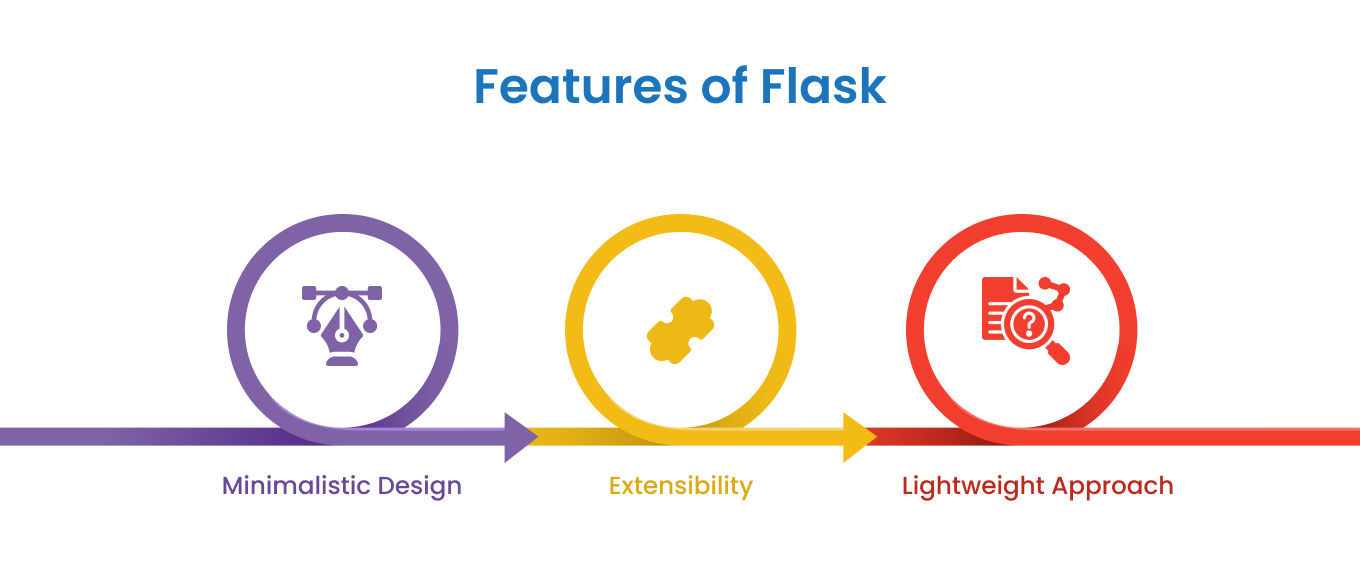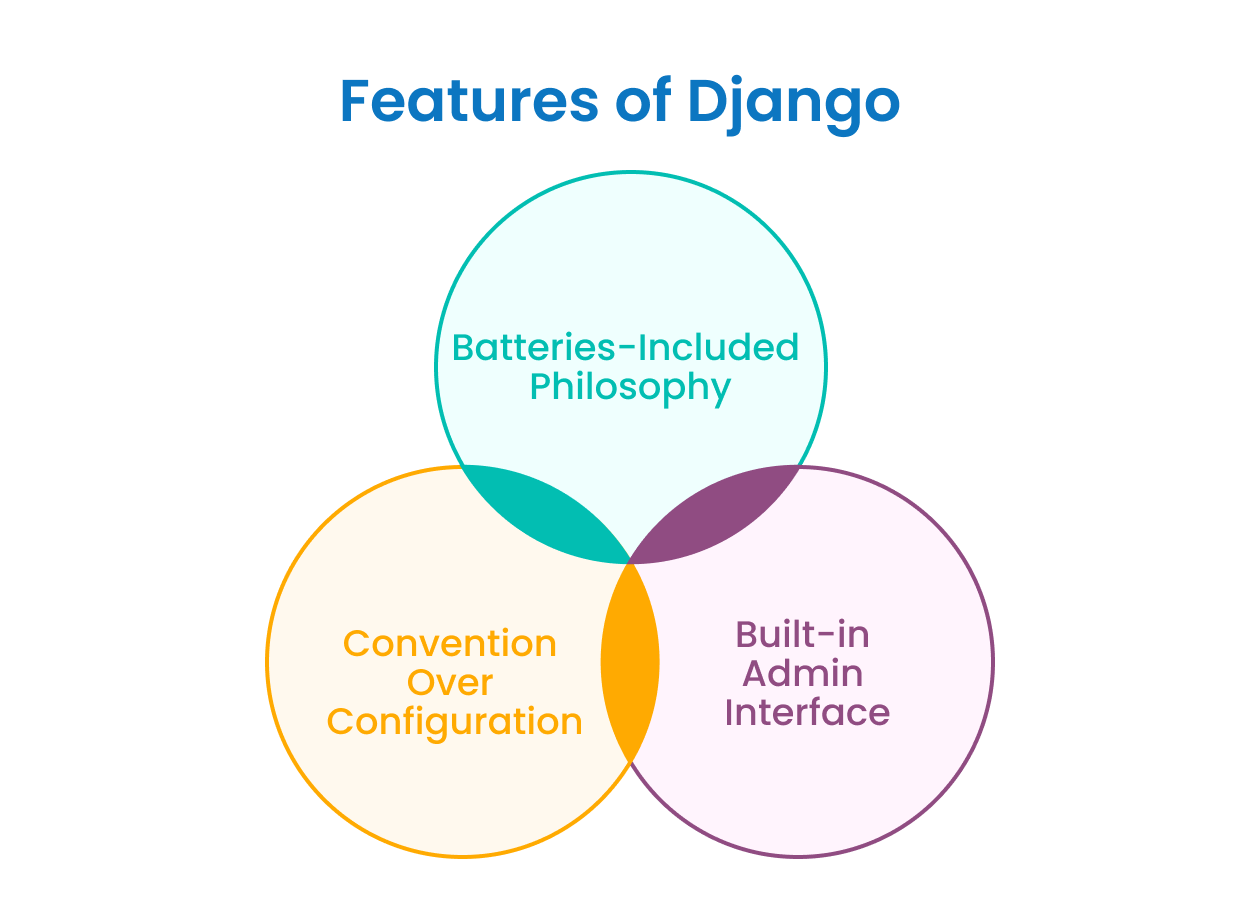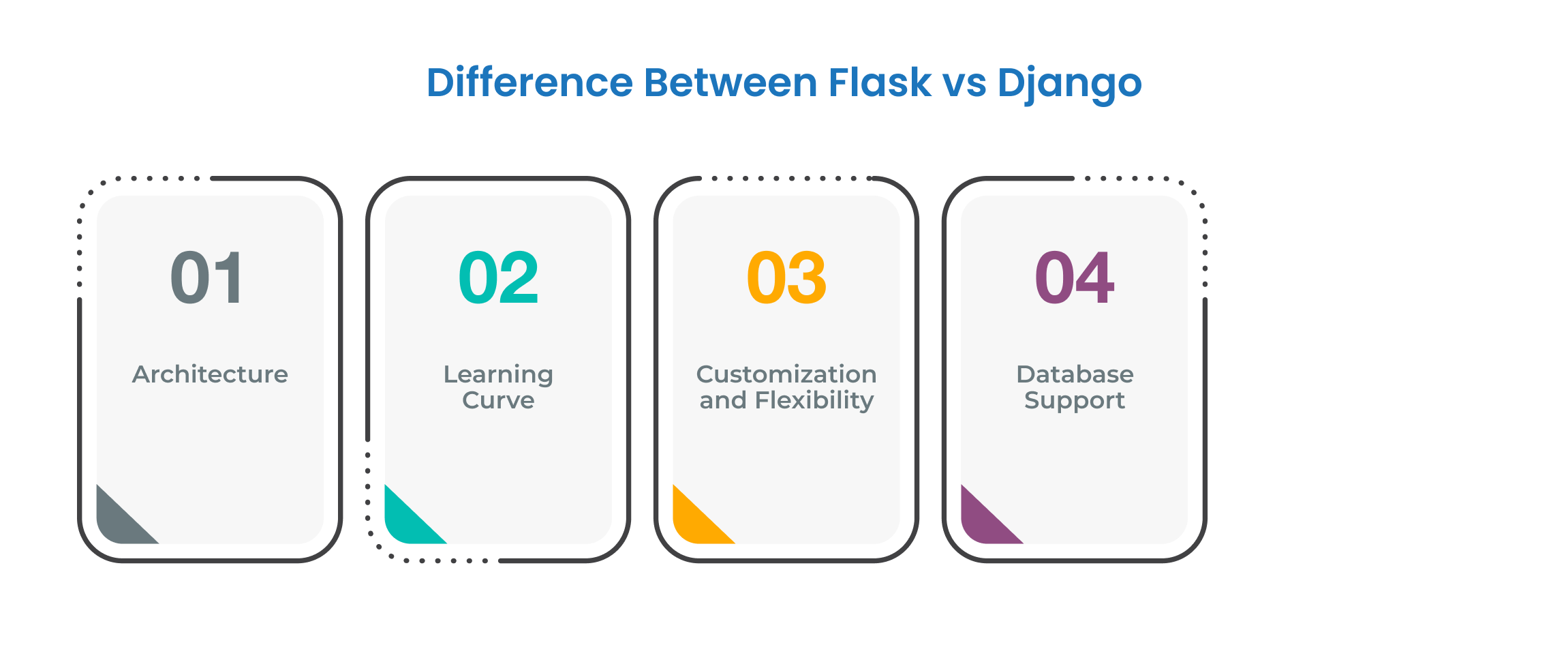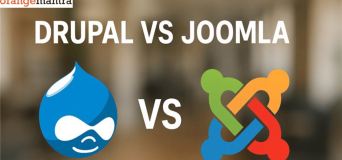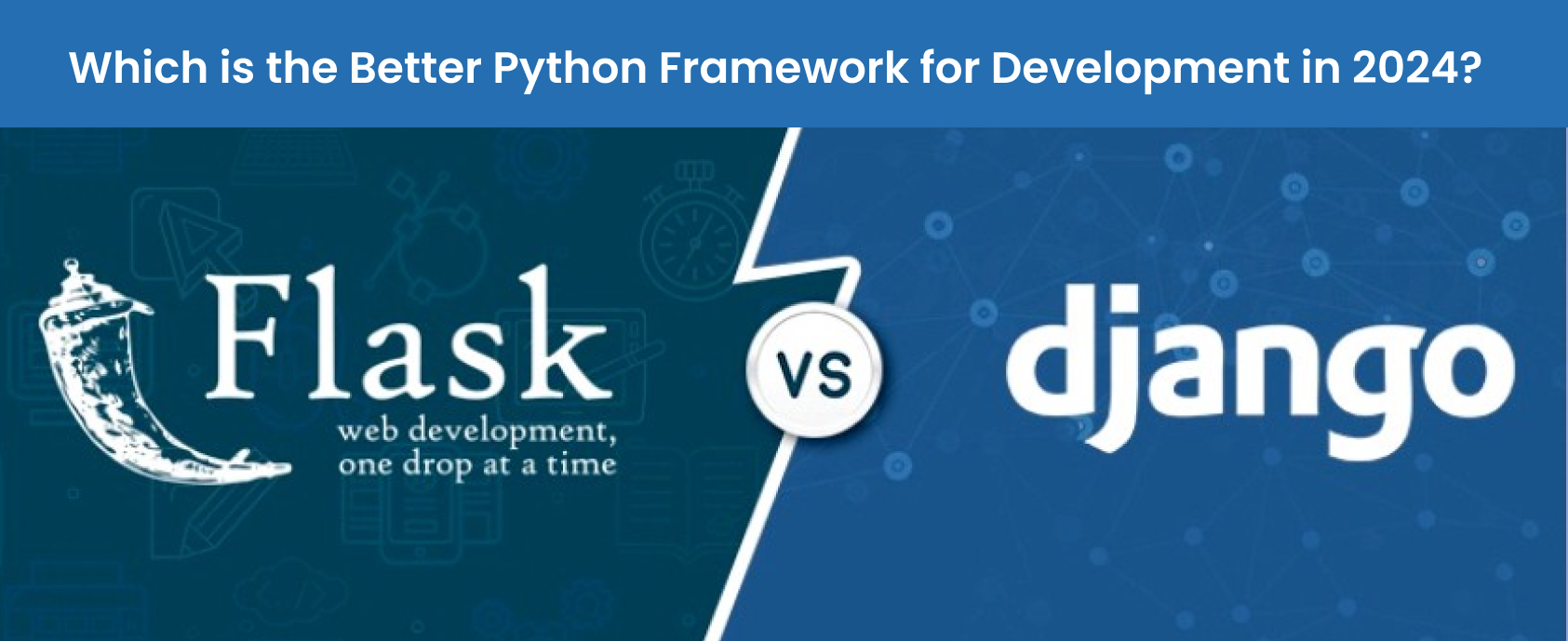
Explore the Flask vs Django comparison for 2025 to find which Python framework suits your project best. Understand their features, performance, and scalability to make the right web app development choice.
Here's What You’ll Learn
- Core differences between Flask and Django frameworks.
- Which framework fits small, mid, or enterprise-level projects.
- Expert insights to choose the right Python framework for 2025.
Why are some of the world’s biggest brands betting on 2 Python frameworks?
Netflix, Airbnb, and Uber rely on Flask. Instagram, Pinterest, and Quora depend on Django.
Despite being built by the same programming language, Django and Flask solve different business challenges.
Flask thrives on flexibility and offers customization. While Django is designed to handle large-scale platforms and offers tight security for common web vulnerabilities.
If you’re planning to revamp or build your website from scratch, and are confused between Flask Vs Django – This guide is for you.
It’ll break down these frameworks and help you decide.
Table of Contents
Introduction of Flask
Flask is a Python framework known for its simplicity and flexibility. It is lightweight, so developers work with only what they need to build efficient web applications. Its modular design helps teams meet precise requirements without adding complexity. Flask suits web development services that demand fast delivery and clear control over the application structure.
Features of Flask
Minimalistic Design
This feature provides developers with a clean platform to build upon, and eliminates unnecessary troubles or rigid practice. This minimalist design boosts creativity and empowers developers to create applications with complete precision and simplicity.
Extensibility
Being a minimalist design, Flask has a vivid ecosystem of extensions and plugins helping improve application functionality. From integrating authentication mechanisms to providing database support, or RESTful API, the web framework ensures that developers have the relevant tools to serve diverse project needs.
Lightweight Approach
To manage resources and keep optimized performance within the application requires a lightweight footprint. By reducing overhead and focusing on key functionality, the Flask web framework enables web developers to build quick and responsive web applications for engagement.
Why Tech Giants Choose Flask
1. Customizability
Building APIs and microservices tailored to your exact needs. No unnecessary features, just the functionality your business requires.
2. Rapid Prototyping
Launch MVPs quickly and iterate faster. Accelerate innovation by testing ideas without heavy infrastructure overhead.
3. Cost-Effectiveness
Pay only for what you use and avoid bloated solutions. Reduce web app development complexity and lower overall operational expenses.
4. Integration Friendly
Connect effortlessly with modern frameworks like React and Vue.js. Works smoothly with AI models and popular development tools.
Introduction of Django
Django is another Python-based framework serving web development. It is a high-level web framework helping rapid web development with efficiency. Getting features of multiple old frameworks including CherryPy, Zope, and Plone, the framework is known to offer better performance. Developers love Django for standard functionalities with minimal interference of systems, and protocols. Agile development aims to provide quality with rapid feature addition and efficiency. Django can perform basic development functions including site maps, content organization, and more. The whole objective is focused on finishing the application as quickly as possible.
Features of Django
Batteries-Included Philosophy
This feature named “batteries-included” philosophy provides developers with a comprehensive set of tools and components. Ranging from an ORM (Object-Relational Mapping) system to the admin interface, Django involves multiple features resolving web development challenges.
Convention Over Configuration
Another feature to keep a check on Django web development is the “Don’t Repeat Yourself” (DRY) and “Convention Over Configuration” (CoC) principles. This lowers the boilerplate code and promotes code reuse with proper maintainability. By following standardized conventions and patterns, Django streamlines development and fosters project consistency.
Built-in Admin Interface
One of the standout features of Django to keep a check is the built-in admin interface. Here developers have the liberty of using a powerful tool to manage database records, user authentication, and other admin tasks. The presence of a predefined admin interface offers a user-friendly interface to carry out CRUD (Create, Read, Update, Delete) operations without requiring custom code.
Why Businesses Love Django
Enterprise-Grade Security
Built-in security protects your application from day one. Compliance support helps you meet industry standards with confidence.
Rapid Development
Pre-built tools and generators get your project running immediately. Spend less time on boilerplate and more time-building features.
Structured Codebase
Enforced architecture keeps your code organized. Teams collaborate more effectively with clear conventions and standards.
Strong Ecosystem
Access thousands of plugins and extensions for any functionality. Leverage a mature community with proven solutions and regular updates.
Flask Vs Django: Head-to-Head Comparison
| Aspect | Flask | Django |
|---|---|---|
| Framework Type | Microframework | Full-stack framework |
| Architecture | Modular and flexible | Structured (Model View Template) |
| Learning Curve | Easy to learn | Moderate to advanced |
| Development Speed | Faster for small projects | Faster for complex apps |
| Scalability | Excellent for modular scaling | Great for enterprise-scale growth |
| Security | Add through extensions | Built-in security features |
| Performance | Lightweight and fast | Optimized for large systems |
Use Cases: Which Framework Best Suits Your Business?
Choose Flask When:
1. You want to build dashboards, microservices, or APIs.
2. Need flexibility with minimal overhead.
3. You’re working with a fast-paced team.
4. Rapid iteration is important for your team.
Choose Django When:
You want to build a full-stack web application.
You prefer structured workflows and consistent coding standards.
Long-term maintenance matters to you.
You’re building a large-scale enterprise solution.
Difference Between Flask Vs Django
By considering these below mentioned differences between Django and Flask, developers and businesses can make informed decisions for their next web development project. Whether opting for Flask’s simplicity and flexibility or Django’s advanced features, both frameworks bring powerful solutions for Python application development.
Architecture
Flask has a minimalist, micro-framework architecture for web app development. It provides developers with important tools to build applications without imposing any sort of dependencies. This gives developers better control over the web application’s structure and design, making it a great addition to medium-sized projects.
Django operates on a full-stack, batteries-included architecture for web app development. It offers multiple features and conventions to build complex web applications. The availability of the design and built-in components simplify the development process for developers. Common tasks including database management, authentication, and URL routing are easy to perform.
Learning Curve
Flask has a simple and minimal learning curve for both new and experienced developers. The lightweight footprint and engaging API surface help web app developers learn and experiment with Flask quickly. It is an excellent choice for developers starting their first web development project.
Django is relatively more powerful than Flask but has a complex learning curve due to its comprehensive features. Developers must be familiar with Django’s ORM, admin interface, and overall project structure. However, the extensive documentation and strong community base help address the complexities of a learning curve.
Customization and Flexibility
Flask flexibility and customization options are available due to its minimalist design and modern architecture. Developers have complete access to selecting and integrating of components they require, supporting highly customized and lightweight web applications.
Django has more options to consider like a structured framework with built-in features and conventions. This helps to promote code consistency and easy maintenance. While this standard action restricts some flexibility but extensive ecosystem of third-party packages and Python development company guidance ensure access to additional customization options.
Database Support
Flask has no support for databases but is easy to integrate with reputed ORMs including SQLAlchemy and databases like SQLite, PostgreSQL, and MySQL. Developers for web app development can choose the ORM and database addressing their project requirements.
Django is powered with a built-in ORM (Object-Relational Mapping) that abstracts away database interactions. This is a great addition to working with different database engines, consisting of SQLite, PostgreSQL, MySQL, and Oracle. The ORM simplifies database management and facilitates developers with data models implementing Python classes.
Project Size and Complexity
Flask is well-suited to create lightweight, microservices, and small to medium-sized web applications. The presence of minimalist design and flexibility is a great add-on in a competitive world. It excels in challenging web development where simplicity, speed, and control are demanding.
Django, on the other hand, is suited for larger, and complex applications with extensive feature requirements. The availability of comprehensive features makes it a great choice for building scalable, enterprise-grade web applications having proper business logic and workflows.
Frequently Asked Questions
Q. What is Flask/Django?
Ans. Flask and Django are both Python web frameworks. Flask is a lightweight and minimalist framework, while Django has comprehensive architecture that implements “batteries-included” philosophy.
Q. Which framework should I choose, Flask or Django?
Ans. The selection between Flask Vs Django depends completely on your project requirements and personal needs. Flask is used in building small to medium-sized projects, while Django can be an add advantage for larger projects with built-in features including ORM, admin interface, and authentication.
Q. Is Flask/Django suitable for beginners?
Ans. Yes Flask and Django are perfect for beginner-friendly frameworks. Flask is easy to learn because of its minimalist design and simplicity. Django, on the other hand, has a complex learning structure but provides built-in features and conventions to help web app development.
Q. Can Flask/Django be used for building APIs?
Ans. Yes, both Python web framework can be used to build APIs. Flask is lightweight and well-suited to build RESTful APIs having custom endpoints, while Django has powerful tools including Django REST Framework for building APIs with serialization, authentication, and viewsets.
Q. Is Flask/Django perfect for real-time applications?
Ans. Flask and Django have features to build real-time functionality, but additional libraries including Flask-SocketIO or Django Channels are needed. Flask is usually for lightweight real-time applications, while Django has major contribution to build larger applications with real-time features.
Wrapping Up
In conclusion, both Python web frameworks are powerful enough to build engaging and futuristic web applications. Flask’s minimalist design and flexibility is really helpful in development of small to medium-sized projects. When comes to building complex web applications, Django’s “batteries-included” approach is a game-changer.
Whether you choose Flask or Django for your project requirements, consult a professional Python development company. OrangeMantra is the perfect business partner for building complex applications with advanced features that support brand expansion. Regardless of your choice, experts at OrangeMantra offer extensive and custom Python development services. So, why wait? Explore and leverage the full expertise of Flask and Django frameworks for your next web development venture.

